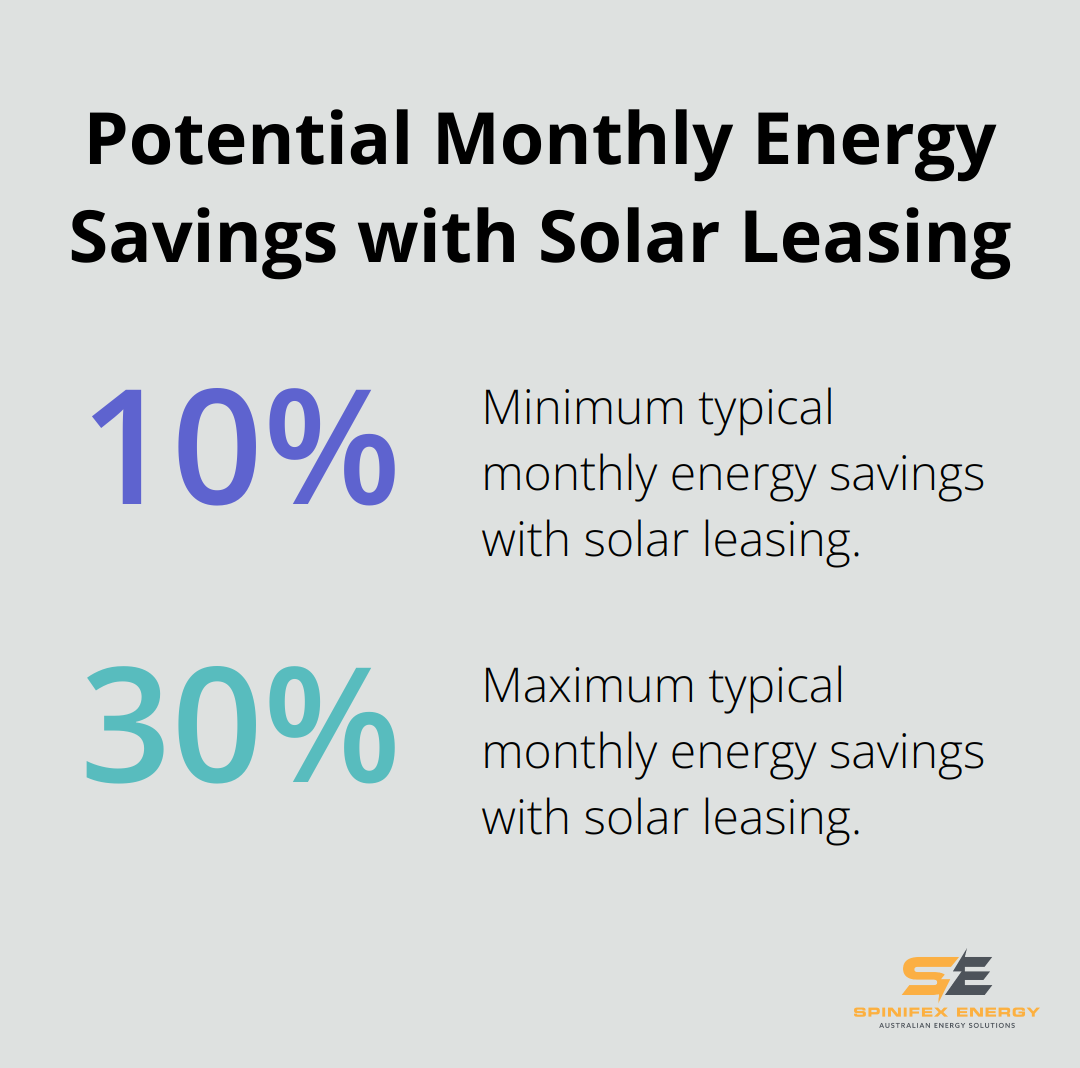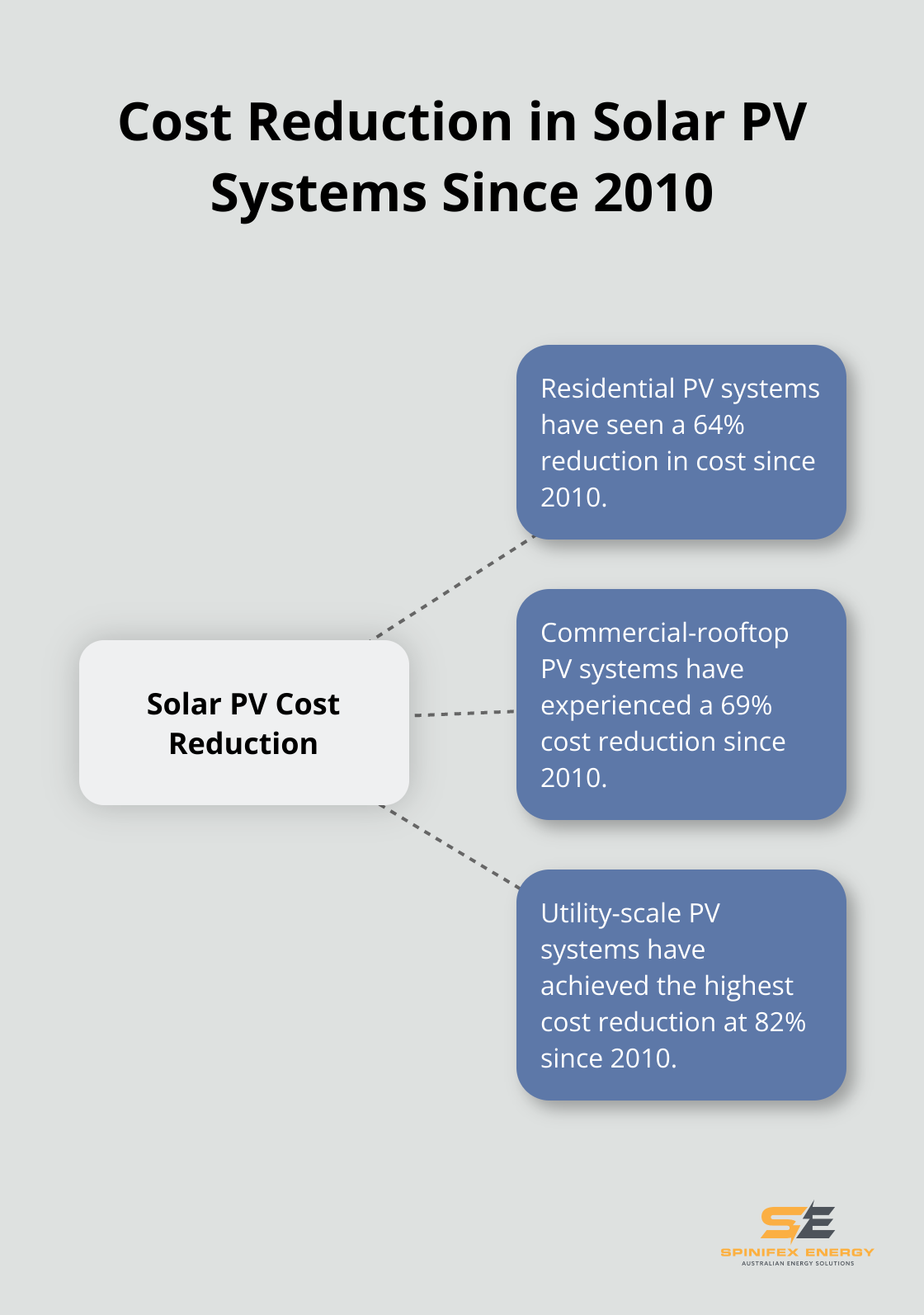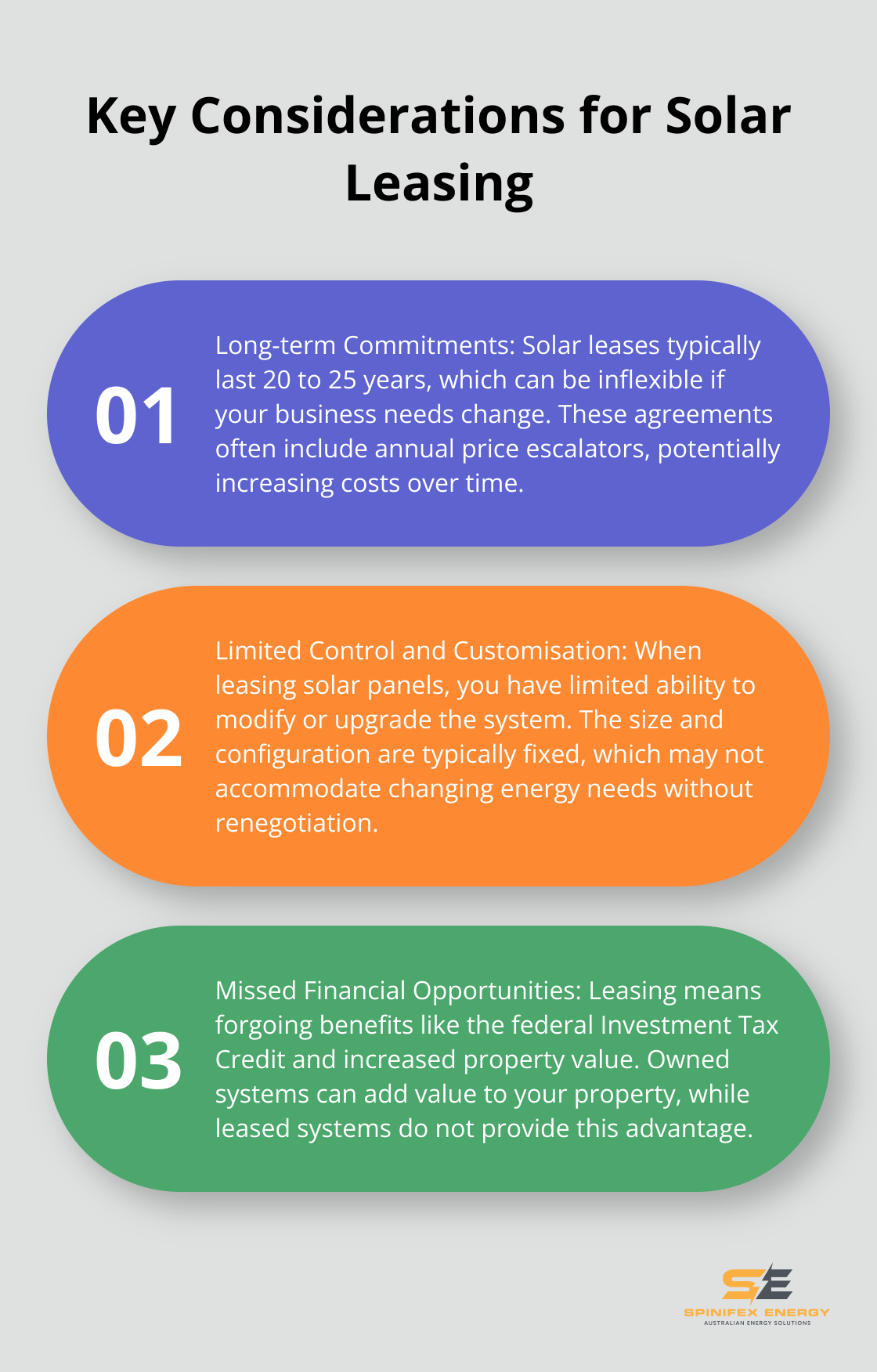Solar leasing has become a popular option for companies looking to harness renewable energy without the hefty upfront costs. At Spinifex Energy, we’ve seen a growing interest in this financing model among businesses of all sizes.
But is solar leasing the right choice for your company? This post will explore the pros and cons, helping you make an informed decision about powering your business with solar energy.
What Is Solar Leasing for Businesses?
Definition and Basic Concept
Solar leasing is a financing option that enables companies to use solar energy without purchasing the equipment outright. This approach allows businesses to adopt green energy and reduce electricity bills without a substantial initial investment.
How Solar Leasing Works
In a solar leasing arrangement, a company partners with a solar provider who installs and maintains the solar panel system on the business premises. The business pays a fixed monthly fee to use the energy generated by these panels. This fee typically undercuts traditional electricity bills, resulting in immediate savings.
Leasing vs. Purchasing Solar Panels
The primary distinction between leasing and purchasing solar panels lies in ownership and financial structure. When a company purchases solar panels, it owns the system outright and assumes responsibility for maintenance and repairs. It also benefits from available tax incentives and the full long-term savings of the system.
Leasing, however, does not involve ownership. The solar company retains ownership of the panels and handles their upkeep. While this means companies miss out on some long-term benefits, it also shields them from the risks and responsibilities of ownership.
Key Players in a Solar Lease Agreement
A typical solar lease agreement involves three main parties:
- The business (lessee): The company that agrees to host the solar panels and pay a monthly fee for the energy they produce.
- The solar leasing company (lessor): The entity that owns, installs, and maintains the solar panel system. They ensure the system performs as promised.
- The utility company: They remain involved, as businesses usually need to stay connected to the grid for times when solar energy isn’t sufficient.
Some agreements may also involve third-party financiers or energy service companies.
Financial Implications of Solar Leasing
The Solar Energy Industries Association tracks trends and trajectories in the solar industry that demonstrate the diverse and sustained growth of solar across the country. Businesses can typically save between 10% and 30% on monthly energy payments with a solar lease.

However, companies must carefully review the terms of any lease agreement. Some contracts include escalator clauses that increase payments over time, which could affect long-term savings. It’s advisable to seek professional advice (such as from energy consulting services) to navigate these complexities and make informed decisions about energy procurement strategies.
As we move forward, let’s explore the advantages that solar leasing can offer to companies, providing a clearer picture of why this option has gained popularity in recent years.
Why Solar Leasing Makes Financial Sense
Immediate Cost Savings
Solar leasing offers businesses a smart way to reduce energy costs without a large capital outlay. The average Australian business can save around $50,000 after installing solar panels, but savings will vary depending on location and other factors. This reduction in operating expenses can significantly impact a company’s bottom line from the first day of installation.
No Large Upfront Investment
Traditional solar installations often require a substantial initial investment. Solar leasing eliminates this barrier, allowing businesses to adopt clean energy without tying up capital. This approach frees up funds for other critical business operations or investments.
Predictable Energy Costs
Solar leasing provides businesses with stable, predictable energy costs. This predictability proves invaluable for budget planning and financial forecasting. Since 2010, there has been a 64%, 69%, and 82% reduction in the cost of residential, commercial-rooftop, and utility-scale PV systems, respectively, making solar an increasingly attractive option for cost-conscious businesses.

Hassle-Free Maintenance
With a solar lease, the leasing company takes responsibility for all maintenance and repairs. This means businesses can enjoy the benefits of solar power without worrying about the technical aspects of system upkeep. It’s a hands-off approach that allows companies to focus on their core operations.
Potential Tax Advantages
While businesses that lease solar systems may not qualify for all federal incentives, they can still benefit from the STC and LGC incentives currently in place. For instance, lease payments may qualify as tax-deductible business expenses. (It’s always best to consult with a tax professional to understand the specific implications for your company.)
Solar leasing presents a compelling case for businesses looking to reduce energy costs and embrace sustainable practices. However, it’s important to carefully consider all aspects before making a decision. Let’s now explore some potential drawbacks and considerations to keep in mind when evaluating solar leasing for your company.
What Are the Risks of Solar Leasing?
Long-Term Commitments and Inflexibility
Solar leases typically last 20 to 25 years, which represents a significant commitment for any business. This long-term obligation can create problems if your company’s energy needs change or if you decide to relocate. Breaking a lease early often results in substantial penalties (sometimes as high as the remaining payments for the entire lease term).
These agreements often include annual price escalators, which increase the monthly payments annually. While this might align with projected increases in electricity costs, it’s not guaranteed. If energy prices fall or remain stable, you could end up paying more than necessary in the long run.
Limited Control and Customization
When you lease solar panels, you don’t have the freedom to modify or upgrade the system as you see fit. The leasing company maintains control over the equipment, which can frustrate you if new, more efficient technologies become available during your lease term.
Additionally, the size and configuration of the system are typically determined at the outset of the lease. If your energy needs increase, you may not have the option to expand your solar capacity without renegotiating your entire agreement.
Complex Agreements and Hidden Costs
Solar lease agreements can be intricate, often containing clauses that aren’t immediately apparent. For example, some leases include production guarantees that sound beneficial but may come with complex terms about system performance and compensation.
There might also be hidden costs related to insurance, property taxes, or system removal at the end of the lease term. You should scrutinise these agreements carefully, preferably with the help of a legal professional or an energy consultant.
Power Purchase Agreements (PPAs) or leases require little to no upfront investment but may yield lower overall savings due to ongoing payments. This is an important consideration when weighing the risks and benefits of solar leasing for your company.

Final Thoughts
Solar leasing offers businesses a way to adopt renewable energy without large upfront costs. It provides immediate savings, predictable energy expenses, and maintenance-free operation. However, companies must weigh these benefits against long-term commitments, limited system control, and potential missed financial opportunities.
Your company’s energy needs, financial situation, and growth plans should guide your decision on solar leasing. We at Spinifex Energy provide energy consulting services to help businesses navigate these complex choices. Our expertise can help you reduce electricity costs while promoting sustainability.
Solar leasing isn’t a universal solution, but it can be an attractive option for many businesses. A thorough evaluation of the pros and cons, coupled with expert advice, will lead to an informed decision that serves your company’s energy needs and financial goals best. Embracing solar energy marks a step towards a more sustainable and cost-effective future for your business.

